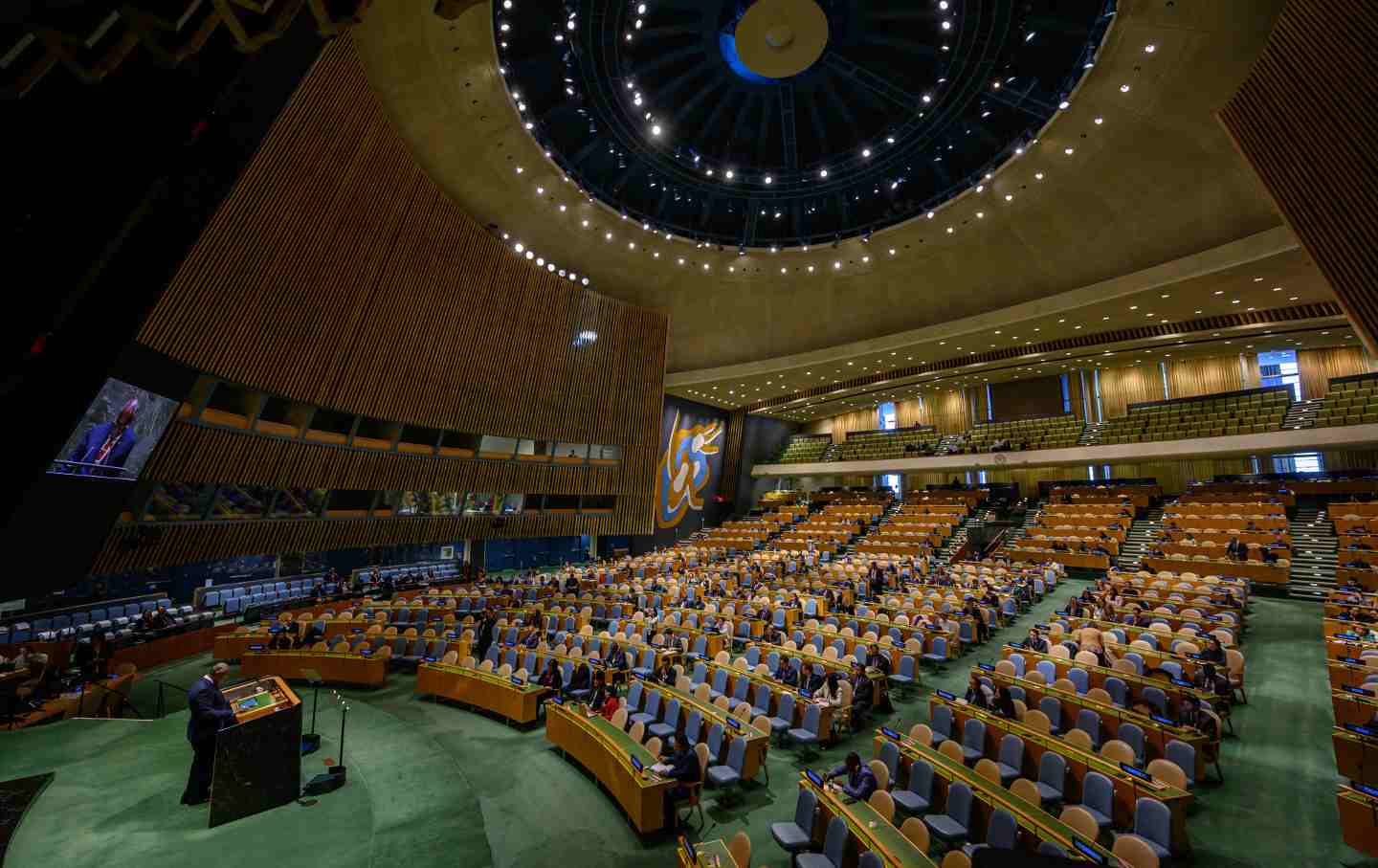
Vanuatuan Prime Minister Ishmael Kalsakau speaks prior to a vote on a resolution aimed at fighting global warming, at the general assembly hall of the United Nations headquarters in New York on March 29, 2023.(Ed Jones / AFP via Getty Imagess)
A small miracle happened in New York on March 29. A humble campaign that began three years ago on the Vanuatu campus of the University of the South Pacific culminated in the adoption of a UN General Assembly resolution requesting an advisory opinion on climate change from the International Court of Justice.
The resolution was a diplomatic feat of herculean proportions on the part of the government of Vanuatu. The significance of the achievement lies in the unique contribution that the world’s highest court could make to global action on climate change. By providing authoritative advice to all nations, the court could unlock the power of international law to bring about the kind of transformations that the climate crisis requires.
The UNGA has asked the court to clarify the legal obligations of countries in regards to climate change as well as the legal consequences for countries that have caused significant harm to the climate system. The UNGA has asked that these questions be answered with regard to a wide range of rules of international law, not just the United Nations Framework Convention on Climate Change or the Paris Agreement.
For the first time in history, the court could set out in well-defined and transparent terms the responsibilities of states to protect both the climate system and the rights of present and future generations from climate-induced harms. Further, the court could recognize that those harms are disproportionately felt by those least responsible for them—small-island developing states and other countries considered particularly vulnerable, owing to geographic circumstance, a history of colonization, or other factors. And it could spell out the specific ways states should correct these inequalities and repair climate harm.
The court could do all of this in a way that integrates human rights considerations with climate responsibilities, thereby operationalizing the demand set forth in the Paris Agreement that states “should, when taking action to address climate change, respect, promote and consider their respective obligations on human rights.” Such an opinion could put the nexus between climate change and human rights on firm international law footing.
To take one example, a progressive advisory opinion could help ratchet up mitigation ambition across the board. We all know that the level of ambition under current Nationally Determined Contributions (NDCs) is far from what is needed to achieve the globally agreed-on limit for temperature rise. An ICJ advisory opinion could emphasize that, under international law, raising NDC ambition is a matter not of “discretion” but of “diligence” and, more specifically, the kind of diligence that is legally required under both the Paris Agreement and other applicable rules of international law, such as the duty of due diligence and the principle of prevention of significant harm to the environment.
We need this advisory opinion now more than ever. As confirmed by the latest IPCC report, the window in which to avoid climate catastrophe is closing. One of its most sobering findings is that there is now a more than 50 percent chance that global temperatures rise will reach or surpass 1.5°C between now and 2040.
For the people of Vanuatu, indeed for Pacific peoples in general, this is akin to a death sentence. As such, it is unacceptable. It is also not inevitable. As the authors of the report took pains to point out, technically speaking, there is still time to limit global warming to 1.5°C, assuming that states commit themselves to the task (among others) of quickly and dramatically reducing their greenhouse gas emissions in the near term.
That’s where the court comes in. By providing an objective yardstick with which to assess states’ compliance with their legal obligations as concerns climate change, the court could provide specific guidance for states that are grappling with the need for greater ambition on mitigation, adaption, and financial support.
From our vantage point as the leads of the legal team assisting Vanuatu in this effort, we see the country’s success as a testament to its tremendous determination in the face of adversity. Vanuatu is one of the most climate-vulnerable countries in the world; last month, it was hit by two Category 4 cyclones in two days.
Not only is Vanuatu leading the campaign for an ICJ advisory opinion on climate change, but it’s also calling on all states to sign up to a fossil fuel nonproliferation treaty to phase down coal, oil, and gas production in line with 1.5°C. Vanuatu may be small, but its emancipatory vision is huge, and it is committed to solidarity and collective action.
The present decade, in some ways the most turbulent in the history of the human race, is our last chance to get it right. And now we are one step closer to success by virtue of the question that Vanuatu, flanked now by the rest of the world, has asked the International Court of Justice. To be sure, it’s an epic question. Epic in the truest sense of the word, meaning it asks the court to bring the entirety of international law to bear on the conduct that has driven our planet to the brink of catastrophe.
The court’s answer could turn the tide.
Julian AguonTwitterJulian Aguon serves as lead counsel to Vanuatu in its pursuit of an advisory opinion on climate change from the International Court of Justice. He is also the author of No Country for Eight-Spot Butterflies and was a finalist for the 2022 Pulitzer Prize in commentary.
Margaretha Wewerinke-SinghTwitterMargaretha Wewerinke-Singh serves as lead counsel to Vanuatu in its pursuit of an advisory opinion on climate change from the International Court of Justice. She is also a law professor at Amsterdam Law School who has published widely on international law, human rights, and climate change.